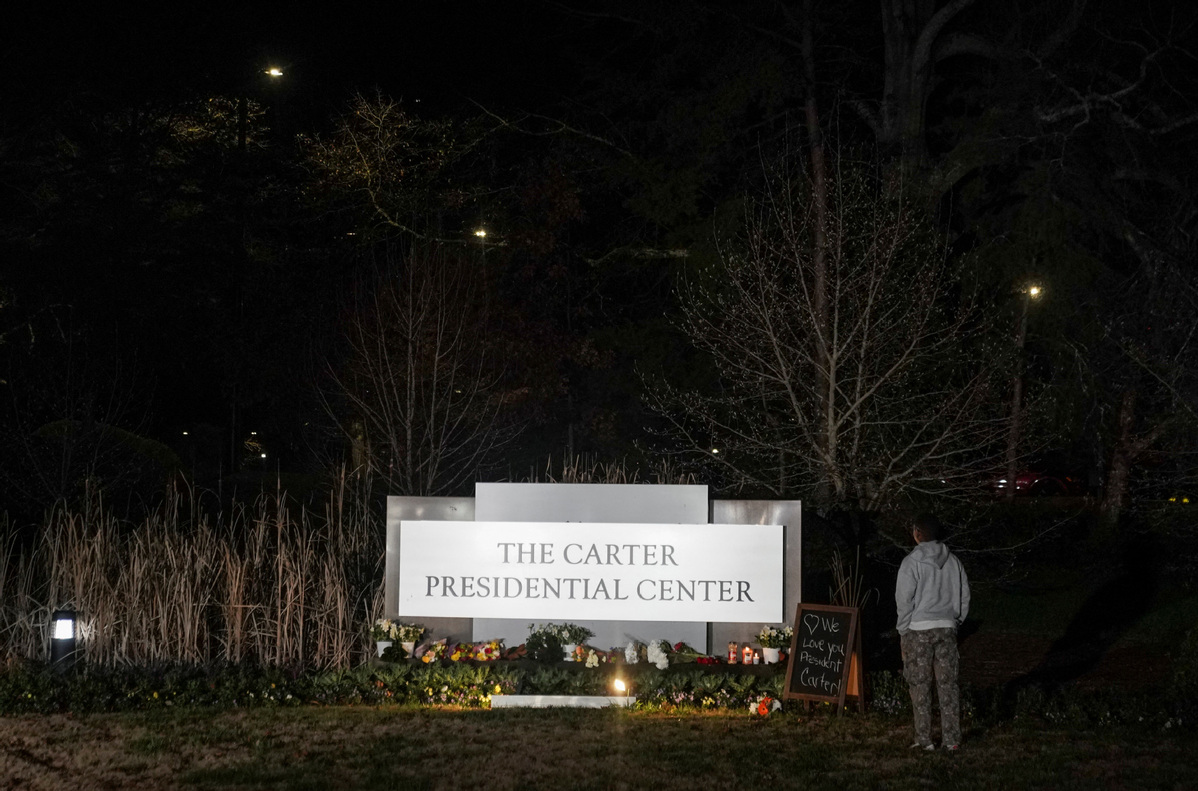Incoming US administration should carry forward Carter's legacy as a friend of China: China Daily editorial
chinadaily.com.cn | Updated: 2024-12-30 19:42

Former US president Jimmy Carter, who died on Sunday at the age of 100, will always be remembered for the pivotal role he played in the establishment of diplomatic relations between China and the United States.
It was thanks to his vision, courage and wisdom that the normalization process started by his predecessor Richard Nixon in 1972 went on, finally leading to Carter himself announcing in a national speech on Dec 15, 1978, that the two countries would recognize each other and establish diplomatic relations. That not only helped open up broad vistas for cooperation between the two countries in the political, economic, scientific, technological and cultural fields in the following decades, but also contributed significantly to peace and stability in the Asia-Pacific region and beyond, attesting to his remark that "the change that I'm announcing tonight will be of great long-term benefit to the peoples of both our country and China".
The foresighted decision he made complied with the trend of the times as it was based on the recognition of the important role China — with one-fourth of the world's population at that time — was playing in world affairs, "a role that can only grow more important in the years ahead".
The 39th president of the US did not visit China during his tenure in office from 1977 to 1981, but Carter visited the country more than 10 times in a span of nearly 30 years after that. He called himself "a friend of the Chinese people", and worked tirelessly to help strengthen understanding between the two countries so that relations could keep improving.
In face of increasing criticism in the US in recent years trying to depict China as the largest "threat" to US national security and one that is seeking to replace the US order, Carter was among the few sober-minded statesmen that saw China's economic strength in a rational way and tried to ease the ideologically driven hostility against it. He noted that China's development had been facilitated by sensible investment and buoyed by peace. "Since 1979, do you know how many times China has been at war with anybody?" Carter asked in April 2019. "None. And we have stayed at war." While China has some 18,000 miles (28,800 kilometers) of high-speed rail, the US has "wasted, I think, $3 trillion" on military spending, he noted. The overall length of China's high-speed rail is 47,000 kms now.
Rather than seeing China as an adversary to the US globally, Carter insisted the country plays a crucial role in many global issues ranging from the denuclearization of the Korean Peninsula to the post-conflict reconstruction in the Middle East and Africa, and from countering terrorism and extremism to mediating international disputes. "The United States should return to the Paris climate accord and work with China on environmental and climate-change issues, as the epic struggle against global warming requires active participation from both nations," Carter wrote in an article published by The Washington Post in December 2018.
Carter was worried about the increasingly vociferous narratives in Washington about China seeking to challenge US supremacy and reduce the US' influence around the world, calling them "dangerous notions" that could lead to a modern Cold War, and warned that misperceptions and miscalculations regarding the Taiwan question and the South China Sea issue could escalate into military conflict and even create a worldwide catastrophe. The answer to the problems facing Sino-US relations, he believed, should be the "conviction that the United States and China need to build their futures together, for themselves and for humanity at large".
One area of engagement Carter facilitated that he took great pride in was student exchange programs between the two countries. "Deng (Xiaoping) asked me if China could send 5,000 students, and I answered that China could send 100,000," Carter wrote. The following years witnessed one of the largest cross-border flows of students in modern times, with nearly 320,000 Chinese students enrolled in US institutions during the 2020-21 school year, about one-third of all international students studying in the US.
And during his visit to the US in November 2023, President Xi Jinping invited 50,000 US youths to China over the next five years for exchanges and study. The increasing exchanges between the two peoples, especially between the youth, bode well for future China-US relations and will help drive forward "the cause of peace" that Carter sought to advance when he decided to normalize ties with China.
The breakthrough made in Sino-US relations during Carter's administration led to mutual respect, peaceful coexistence and win-win cooperation serving as the guidance for the development of bilateral ties. This should continue to be the case.
























